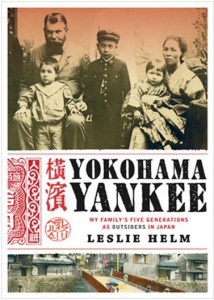JQ Magazine: Book Review — ‘Yokohama Yankee’

“Yokohama Yankee shows how the events that precede us—the social and political movements, wars, technological advances, and natural disasters—inform our attitudes and behaviors.” (Chin Music Press)
By Michael Glumac (Miyazaki-ken, 2008-09) for JQ magazine. Michael is currently enrolled as a graduate student in international affairs, and has been a music publicist and artist manager.
Pages of Leslie Helm‘s new book Yokohama Yankee seem as though they might be perfectly at place in a Dan Brown novel, and this I mean in the most complimentary manner possible.
Really.
Helm’s non-fiction account of his family’s five generations as outsiders in Japan possess none of the mixed metaphors or historical incongruence so mocked in the Da Vinci Code author’s oeuvre. Portions of Yokohama Yankee, though, where Helm explores remote regions of Japan to uncover the story of his ancestors, possess genuine intrigue surpassing any poorly imagined scuffle with murderous druids.
In an effort to learn about his German great-great-grandfather Julius’s Japanese wife (who once stopped a sword with her bare hands), Helm enlists the help of Buddhist priests to pore over a mountain village temple’s old rice paper scrolls. From the ruins of a Roman aqueduct-like bridge, Helm identifies a mysterious abandoned island off the coast of Kyushu. Here his father engaged in a post-World War II love affair with a woman who had rumored royal connections. His exploration concludes:
“On the way back to the boat we came upon a stone monument about twelve feet high that was all but hidden by shrubs. I held the branches back while the director read the inscription carved into the stone: ‘This is to memorialize the visit of his highness…of the Imperial family.’ The aquarium director looked at me with excitement.”
Feat not, the aquarium director doesn’t turn out to be working for a secret sect of Opus Dei.
While the bulk of Yokohama Yankee does not consist of such live-action sleuthing, the Helm family’s story is interesting enough in its own right. The book opens at the memorial of Leslie’s father, who had been the final Helm to serve as president of the family company, Helm Brothers Forwarding Agency. Founded in the mid-1800s by Julius, its fortunes paralleled those of Yokohama as the city transformed from a small fishing village into an international trading port. The Helms would have to rebuild their cranes, ships, and warehouses several times as Yokohama and the family suffered through city-leveling earthquakes, fires, and bombings.
A clan of Germans operating a business in Japan, with several members living in America, the Helms would navigate a complex world in the years surrounding World War II. While some of the family-maintained Helm Brothers operations—which surely in some way were contributing to the Japanese War effort—Leslie’s father studied Japanese at the University of Michigan as part of an intense language training program for U.S. Army officers. (This program, interestingly, would birth several notable luminaries of Japanese studies in the United States such as Columbia University’s Donald Keene.)
The book also chronicles Helms’ own youth as a gaijin in Yokohama. As his father begins to loathe Japan, unhappily wrestling for control of his brothers, Leslie finds a great appreciation for the country and its hospitality during free-spirited journeys by train with other foreign friends—hopefully a relatable experience to any JET with a rail pass, a sense of adventure, and a little nenkyu.
Only after using his journalistic background to investigate his own family history does Leslie understand how both he and his father ended up becoming the men they did. Yokohama Yankee shows how the events that precede us—the social and political movements, wars, technological advances, and natural disasters—inform our attitudes and behaviors. I realize, had my own JET predecessor not left terrible conspiracy fiction novels on my tatami room shelf, I would never be using Angels & Demons as a reference point for this meticulously researched and wonderfully enjoyable multi-generational biography. So sorry, Mr. Helm.
For more JQ magazine book reviews, click here.


Comments are closed.